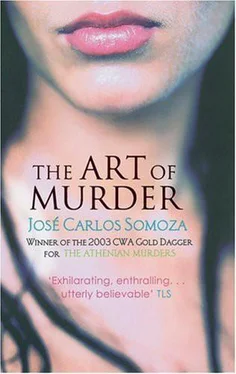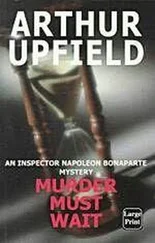Jose Somoza - Art of Murder
Здесь есть возможность читать онлайн «Jose Somoza - Art of Murder» весь текст электронной книги совершенно бесплатно (целиком полную версию без сокращений). В некоторых случаях можно слушать аудио, скачать через торрент в формате fb2 и присутствует краткое содержание. Жанр: Триллер, на английском языке. Описание произведения, (предисловие) а так же отзывы посетителей доступны на портале библиотеки ЛибКат.
- Название:Art of Murder
- Автор:
- Жанр:
- Год:неизвестен
- ISBN:нет данных
- Рейтинг книги:4 / 5. Голосов: 1
-
Избранное:Добавить в избранное
- Отзывы:
-
Ваша оценка:
- 80
- 1
- 2
- 3
- 4
- 5
Art of Murder: краткое содержание, описание и аннотация
Предлагаем к чтению аннотацию, описание, краткое содержание или предисловие (зависит от того, что написал сам автор книги «Art of Murder»). Если вы не нашли необходимую информацию о книге — напишите в комментариях, мы постараемся отыскать её.
Art of Murder — читать онлайн бесплатно полную книгу (весь текст) целиком
Ниже представлен текст книги, разбитый по страницам. Система сохранения места последней прочитанной страницы, позволяет с удобством читать онлайн бесплатно книгу «Art of Murder», без необходимости каждый раз заново искать на чём Вы остановились. Поставьте закладку, и сможете в любой момент перейти на страницу, на которой закончили чтение.
Интервал:
Закладка:
Oslo's attention was caught by something that brought him to a halt: two workmen were out in the garden helping the model portraying Miss Wood out of the tank. Her hours on show were over. Oslo continued watching the removal of the portrait as he carried on speaking.
‘I have to admit that Bruno made the most of both. He travelled all over Europe and America, and set himself up for a time in New York, where he met Jacob Stein. Before that he had been in London and Paris, where he had been in touch with Tanagorsky, Kalima and Buncher. It's hardly strange that he should have been so enthusiastic about hyperdramatic art: he was born to tell other people what they should do. He had always been a painter of people, even before Kalima started to build a theory around the new movement. Bruno used his fortune to make HD the most important art of this century. The truth is, we owe a lot to Van Tysch,' Oslo ended, perhaps more cynically than he had intended.
'This is getting us nowhere,' said Miss Wood, tapping her notebook with her pen. 'From what you tell me, Van Tysch could have as many enemies as he does admirers.' 'Exactly.' 'We'll have to approach it differently.'
Out in the garden, the Debbie Richards model was now completely naked, and one of the workmen was carefully folding up the painted clothing while the other helped her into her robe. Miss Wood studied the girl's physique (even barefoot, she was several centimetres taller) and vaguely wondered if Oslo thought she was equally attractive. The cerublastyne joins around the neck were clearly visible. What could her real face be like? Miss Wood did not know and did not want to know.
As she was thinking this, she took off her sunglasses and rubbed her eyes. Oslo thought: My God, she's so thin, so skinny. Me guessed that April Wood's nervous problems about eating must have increased in recent years. The 'guard-dog' was all skin and bone. He had known her as a puppy.
It was in Rome in 2001, during a series of courses Oslo was giving on the conservation of outdoor pieces. He had never worked out what it was about this slender girl of only twenty-three that had attracted him so much. At first sight, it seemed easy enough: April Wood was beautiful, she dressed with striking elegance, and her culture and intelligence were obvious. Yet there was something within her that led people to immediately reject her. In those days she was working as the security chief for Ferrucioli, and despite the fact that she was already wealthy, she lived on her own and had no close friends. Oslo thought he had discovered what kept her isolated: a deep, slowburning hatred that was like a hidden poison. April Wood emanated hate through every pore.
With the infinite patience he had always shown when it came to helping others, Oslo took it on himself to find the antidote. He managed to find out something about her life. He learnt that her father, an English art dealer living in Rome, had put pressure on April as an adolescent to become a canvas. He also learnt that she was being treated for a problem of nervous anorexia that dated from the time when her father wanted at all costs to make her into a work of art. 'He would call second-rate painters to sketch me in the nude’ April confessed to him one day. 'Then he took photos of me and sent them to the great masters. But I discovered just in time I didn't have the patience to be a canvas. So I devoted myself to protecting them instead.' But to her, 'protecting canvases' meant exactly that. It was as though she did not see them as human beings. The two of them often had arguments about it. Finally Oslo understood that Miss Wood's worst poison was Miss Wood. An antidote to that poison would only have done her more harm.
When April Wood joined the Foundation as its new security director, the distance between them grew. In 2002 they saw each other still less, and by 2003 absence threw its chilly mantle over them both. The word 'end' had never been pronounced. They were still friends, but knew that anything there might have been between the two of them had finished. Oslo thought he was still in love with her. Wood put her glasses on the desk and looked at him.
'Hirum, I'll be straight with you: the person destroying the canvases has the advantage over me.' 'Has the advantage?'
'One of our own people is helping him. Someone from the Foundation.' 'My God’ murmured Oslo.
For a tiny instant, a split second, he thought she had become a little girl once more. Oslo knew that behind her indomitable will there was concealed a poor, lonely and frightened creature which occasionally surfaced in her gaze, but which he was astounded to see at this very moment. But that moment soon passed. Wood took control of her facial expression once more. Not even an expert in cerublastyne could mould a mask as perfect as April Wood's real features, thought Hirum Oslo.
‘I have no idea who it is’ she went on. 'It could be someone in the pay of our competitors. Someone anyway who is in a position to pass on restricted information about when our security people are working, the places where we have our models for safe-keeping, and lots more. We're being sold, Hirum, from inside and outside the Foundation.' 'Does Stein know?'
'He was the first person I told. But he refused to help. He's not even going to try to get the next exhibition postponed. Neither Stein nor the Maestro wants to get mixed up in this. The problem when you work for great artists is that you have to sort your life out for yourself. They're on another plane. They see me as a guard dog – they even call me that – and I don't blame them: that is exactly what they employ me to be. And until now they've been happy with what I've done. But now I'm on my own. And I need help.' 'You've always had me, April. And I'm here for you now.'
They heard laughter out in the garden. It came from young people of both sexes. They were talking and laughing like students on a picnic as they came up to the summerhouse. They were wearing sports clothes and carrying bags on their shoulders, but their skin looked as shiny as polished mirrors in the light from the electric bulbs that had just come on among the trees. They had an almost supernatural appearance, like angels with well-defined bodies, beings from a far-off universe that Hirum Oslo and Miss Wood felt exiled from. They found it hard to look on them without regret. Oslo muttered an apology to Miss Wood, and went to the door.
Wood understood at once that this must be a daily ritual: Oslo's paintings were saying goodbye to him. He talked to them, smiled and joked. She thought of her own house back in London. She had more than forty artworks, almost half of them human ornaments. Some of them were so expensive they carried on in their poses even when she was not there, even if she was away for several weeks. But Miss Wood never said a word to any of them. She crushed out her cigarettes in Ashtrays that were naked men, lit Lamps that were adolescents with depilated, virgin sexual organs, slept next to a painting of three youngsters painted blue who were in perpetual balance, washed alongside two kneeling girls who held gold soap dishes in their mouths, but at no time, not even when they finally left her house at the end of a long day's work, did it ever occur to her to talk to them. But here was Oslo, relating to his paintings like an affectionate father.
After saying goodbye to them, Hirum Oslo sat down again, and lit the desk lamp. The light flamed in Miss Wood's cold blue eyes. 'What time do you have to leave?' he asked. it doesn't matter. I've got a private plane waiting for me in Plymouth. And if I don't feel like driving, I can call a chauffeur to come and pick me up. Don't worry.'
Oslo put the tips of his finger together. His face showed he was worried about something. ‘I suppose you've thought of going to the police.' Miss Wood's smile was heavy with tiredness.
Читать дальшеИнтервал:
Закладка:
Похожие книги на «Art of Murder»
Представляем Вашему вниманию похожие книги на «Art of Murder» списком для выбора. Мы отобрали схожую по названию и смыслу литературу в надежде предоставить читателям больше вариантов отыскать новые, интересные, ещё непрочитанные произведения.
Обсуждение, отзывы о книге «Art of Murder» и просто собственные мнения читателей. Оставьте ваши комментарии, напишите, что Вы думаете о произведении, его смысле или главных героях. Укажите что конкретно понравилось, а что нет, и почему Вы так считаете.












